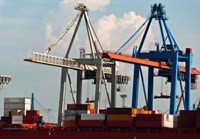As South Africa continues to strengthen its trade ties with countries like China, Germany, Japan and the UK, it is becoming increasingly important for exporters and importers to get to grips with the complexities of arranging marine cargo insurance.
Carmen Pasqualle, marine manager of Lion of Africa Insurance said that with the rise of cargo ship accidents worldwide, including the bulk carrier Smart, which recently ran aground off the main beach at Richards Bay, exporters and importers can least afford skimping on cover, or making costly mistakes that could present their businesses with even bigger problems, in the event of an accident.
"Marine cargo insurance helps exporters and importers to cover the physical damage or loss of their goods while being transported by sea. Failing to arrange appropriate cover can potentially harm a business and have a serve impact on its revenue stream," said Pasqualle.
She advises exporters and importers to take note of the following when taking out marine cargo insurance cover:
Limited cover: Inexperienced exporters and importers often view insurance as a grudge purchase and risk not having adequate cover in place. This exposes their businesses to financial and liability risks in the event of an accident.
Picking on price: During tough economic conditions, exporters and importers have the tendency to shop around for cover only using price as determining factor. Businesses should rather focus on what the policy covers, instead of basing their decision solely on price. Rushing to sign a contract without fully understanding the terms and condition of the policy is a mistake. Each business is unique and has its own insurance needs. For example, a perishable goods importer will have different insurance needs to a components importer.
Reducing liability: Opting for lower liability, or other limits, in order to save on monthly premium costs is certainly not advisable. Exporters and Importers should seek advice from their brokers and insurers to arrange the right amount of cover for their business, as well as to protect personal assets.
Unaffordable deductibles: Exporters and importers should avoid opting for deductibles that they cannot afford. A deductible, commonly known as excess, is the amount that a business will have to pay up front before an insurer can settle a claim. While choosing a higher deductible may help to reduce monthly premium costs, it is best to choose a deductible that will be affordable in the event of a claim.Pasqualle said that exporters and importers should also be familiar with General average, which is independent from marine cargo insurance. "It is an agreement between the ship owner and cargo owners, to share any losses resulting from a voluntary sacrifice of part of the ship or cargo to save the whole during an emergency. General average claims can arise from the ship being stranded, catching fire, damaged engine, and when the ship is in any danger of sinking."
She explained that marine cargo policies come in two forms, namely, open policy, which covers a number of consignments, and a specific policy, which normally covers specific consignments. "There is also an option to take out an all-risk or total loss cargo policy, which covers against all fortuitous losses.
"Regardless of the nature of business, it is advisable to seek advice from a broker or insurer before arranging any type of marine cargo cover, to understand fully exclusions and avoid being over and underinsured in the event of a loss," concluded Pasqualle.































